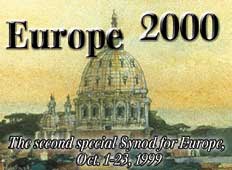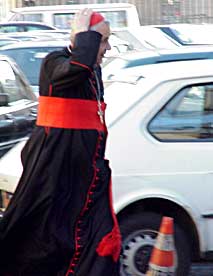

 |
 |
|
|
Martini calls for a new council … almost By
JOHN L. ALLEN JR.

Near the halfway point of the European synod, there’s little doubt in the minds of most observers who has generated its most dramatic moment so far: Cardinal Carlo Maria Martini of Milan, who spoke on Oct. 7. Martini, 72, has headlined the list of papabile so long that his every public utterance is parsed for clues as to where a church under his leadership might head. Martini’s intervention at the synod dangled the tantalizing prospect that it might move straight into Vatican III. Two other interventions have also sparked considerable talk around the synod: those of Belgian Cardinal Godfried Daneels and Cardinal Joseph Ratzinger, the Vatican’s top doctrinal officer. But no one doubts that Martini has, to date, stolen the show. “We are forced to ask, forty years after the announcement of Vatican II, if an awareness for the next decade is not growing little by little of the utility -- and nearly the necessity -- of a collegial and authoritative consultation among all the bishops on some of the key issues that have emerged ,” Martini said. Another synod would not be enough for what he had in mind, Martini said. “Some of these issues probably require a more universal and authoritative collegial instrument, where they can be faced with freedom, in the full exercise of episcopal collegiality, while listening to the Spirit and protecting the common good of the church and all of humanity.” Though the Vatican press office issues only brief summaries of each speaker’s intervention and the specifics of Martini’s ideas were absent from his summary, NCR obtained the full text of Martini’s address. Martini was specific as to which issues he was talking about. “In general, the key task is the deepening and the development of the ecclesiology of communion of Vatican II,” he said. “Another is to address the deficit - in some places quite dramatic - of ordained ministers and the growing difficulty for bishops to ensure the care of souls in his territory through a sufficient number of ministers of the gospel and the Eucharist.” “Others include the position of women in society and the church, the participation of the laity in some ministerial responsibilities, sexuality, the discipline of marriage, the practice of penance, the relationship with the sister Orthodox churches (and in a more generalized manner, the need to revive ecumenical hope), and the need to work out the relationship between democracy and values, between civil laws and moral law,” Martini said. “Increasingly one feels how much it would be beautiful and useful for the bishops of today and tomorrow, in a church by now more and more diversified in its languages, to repeat that experience of communion, of collegiality and of the Holy Spirit that their predecessors had at Vatican II and that by now is no longer a living memory,” Martini told the synod. Though Martini never used the words “a new council,” the Italian press wasted little time reporting his comments that way. One newspaper headlined its account of Martini’s remarks: “Holy Father, call a council.” Others, however, say Martini was talking about a new instrument between a synod and a council. Some observers believe he was offering a critique of the way synods are run under Belgian Cardinal Jan Schotte. Privately, many synod participants chafe at what they perceive to be excessive secrecy and control imposed by Schotte. Many also say the structure of the event, which allows no discussion on the synod floor and which reserves the final conclusions to the pope alone, results in a caricature of collegiality. Whichever interpretation is correct, Martini’s intervention offers dramatic new evidence that in the leadership ranks of the church, collegiality - the idea of shared governance among the bishops and the pope - is an issue that will demand attention in a new pontificate. In the wake of what had been a very pessimistic tone in the synod hall, Daneels won high marks for converting indicators of decline in European Catholicism into signs of hope. What has happened to the church in Europe has been a shock, he said - but like a jolt to the heart, it can lead to revival. For example, Daneels said, growing religious pluralism has forced the church to enter a new dialogue with other religions. Believers must re-think what it means to say that Christ is the only mediator of salvation. It is a new question requiring a new answer, he said. Far from being a threat, Daneels argued that such questions are the ones that bring growth. They are “blessed questions,” he said, and Christians should “thank the epoch” for posing them. Referring to Catholicism’s loss of prestige in Europe, Daneels suggested that God is trying to teach the church humility. “How can that be negative?” he asked. While several speakers have warned of the danger to Europe’s Christian identity posed by the growing number of Moslems on the continent, Daneels drew a careful distinction between forms of Islam that are difficult to speak with and other forms that have much to teach the church. He cited “the transcendence of God, prayer and fasting, and the impact of religion on social life” as positive elements of Islam upon which Christians might reflect. If Daneels stressed ways in which the church could affirm and identify with the broader culture, Ratzinger’s talk cut in the opposite direction, stressing a critical distance between church and world. “How faith is formed and what faith is appear in Jesus' dialogue with the twelve apostles in Cesarea of Philippi where the Church's Creed was born: ‘You are the Christ, the Son of the living God.’ Jesus distinguishes opinions of the ‘people’ concerning his person and the awareness given to ‘You all,’ that is, to the twelve apostles,” Ratzinger said, arguing that this is a metaphor for the distinction between the church and the broader society. “Faith is communion with Jesus in the Church, it is not the invention of a group; it is the gift of the Holy Spirit which unites the Church,” Ratzinger said. “The difference between ‘people’ and the ‘We’ of the disciples will last probably until the end of time,” Ratzinger said. “But the church is not an entity closed up within itself: her frontiers are always open … If it does not meet up with everyone, it is for everyone, being the salt of the earth and light of the world,” the 72-year-old cardinal from Bavaria said. The contrast between Daneels and Ratzinger underscores one of the basic tensions of the synod: how hostile to Christianity the cultures of the first world really are, and whether in seeking to engage the social order the church has sacrificed either spiritual depth or doctrinal clarity. As the synod breaks into small group discussions this week, one can expect this theme to be on the agenda. National Catholic Reporter, October 11, 1999 |